#radical black studies
Explore tagged Tumblr posts
Text
In this incarnation, she appears in the archive of slavery as a dead girl named in a legal indictment against a slave ship captain tried for the murder of two Negro girls. But we could have as easily encountered her in a ship’s ledger in the tally of debits; or in an overseer’s journal—‘last night I laid with Dido on the ground’; or as an amorous bed-fellow with a purse so elastic ‘that it will contain the largest thing any gentleman can present her with’ in Harris’s List of Covent-Garden Ladies; or as the paramour in the narrative of a mercenary soldier in Surinam; or as a brothel owner in a traveler’s account of the prostitutes of Barbados; or as a minor character in a nineteenth-century pornographic novel. Variously named Harriot, Phibba, Sara, Joanna, Rachel, Linda, and Sally, she is found everywhere in the Atlantic world. The barracoon, the hollow of the slave ship, the pest-house, the brothel, the cage, the surgeon’s laboratory, the prison, the cane-field, the kitchen, the master’s bedroom—turn out to be exactly the same place and in all of them she is called Venus.
—Saidiya Hartman, “Venus in Two Acts” (2008)
#saidiya hartman#say her name#radical black studies#black feminist theory#Venus#gender and slavery#cultural studies#israel#palestine#higher education#afterlives#in the wake
1 note
·
View note
Text

the revolution is brewing.
black women, keep your peace.
i always say that i hate the United States but i love the land. this land has nourished my ancestors for centuries and it has given us connection to the earth. seeing what is happening on this soil infuriates me.
i’ve been quiet for about a week since the inauguration, and what i have noticed is that white women are the second biggest detriments to society, the first being white men. we all know that they lied about where they stand when it comes to women’s rights, but now i’m seeing white women act like they had nothing to do with the downfall of our country. they are talking about leaving. they haven’t fought for freedom not nearly as much as black women have and they have nerve to make plans to move abroad? weak! because black women are taking a step back, white women think they can too.
white women in the United States rarely start revolutions without it being attached to black trauma and black justice. they even used black people to get the women’s suffrage movement popularized when the suffrage movement didn’t give any thought to black women. they are constantly using black people for their own agenda!
what i fear is that black women will have to save the country again.
my thoughts on this revolution is not simple. there isn’t a large enough group of people that is currently in the United States that is ready to fight for justice, but my guess is that there will be one day. the government will not help us.
these are some recent revolutions around the world Sri Lanka 2022, South Korea 2025, Hong Kong 2019-2020, Bangladesh 2024, Palestine
i wish i could say more, and didn’t have to choose my words wisely, but you know, censorship.
even though tumblr will pretty much let you post about anything, still censorship is the state that our world is in.
being an observer this time around instead of protesting is an interesting prospective. it has shown me that each set of people is only looking out for their own. even while being oppressed themselves, the rules of this new government don’t seem to bother them until it hits their own communities. i’ve learned that as a black woman who is the most oppressed in this country, that our rights being held in the balance does not matter to other marginalized people unless our problem becomes their problem. it hurts and it is a shame.
my message to us black queens is to make self care a priority, observe, and continue to love who loves you.
#Nicole Angelaé#state of the world#project 2025#feminism#radical feminism#black women#kamala harris#the united states of america#fascisim#girl advice#female writers#black femininity#revolution#women's suffrage#women’s studies#women’s history#history repeats itself
10 notes
·
View notes
Text

assata is such a powerful autobiography and it’s giving me more to think of as i think of what i will concentrate on for my english ma
#study#gradblr#grad school#grad student#studyblr#booklr#bookblr#assata#blacklivesmatter#assata shakur#black radical#black revolutionary#revolutionary texts#reading#reading journal#reading aesthetic#am reading#currently reading#litblr#literature
136 notes
·
View notes
Text
Beboptober 2024 Day 1: Eyes + Introduction
Thanks to @bebopcrew for the prompt list! Am I seriously doing Beboptober on top of all the other stuff I have to do during October this year, fellowship applications (although those are mostly done and filed away for now, at least) and grad school applications and thesis work and all the normal senior-year-of-college stuff? You bet your ass I am!!! Maybe I can just call it a writing exercise, a warm-up for my thesis...and if my insomnia's going to keep me up until horrific hours anyway, I may as well do something productive with it! And even if I don't get to all 31 days, at least we can say I tried...
If anyone's interested, you can see my prompts from Beboptober 2022 here (on Tumblr) and here (on AO3). I can't wait to see what everyone comes up with this year!
His eyes were gray. It was hard to tell at a distance, small and hidden as they were under a thick brow and bushy eyebrows, and in different lighting they could be mistaken for a mousy brown or a light blue. Not that he was given to romantic descriptions of things like eye colors, or anything. He wasn’t much of a poet—not in that way, at least.
The right one had a scar running vertically through it and a metallic piece reinforcing the skin underneath. No one had ever asked about that piece, and he’d never told. It didn’t do to dwell on the past if it didn’t help you in the present. And he could still see out of both eyes just fine. In any case, he supposed the enhancements around his eye weren’t as distinctive as the metal arm, nor as clear a reminder of the betrayal in his past. Losing his arm was dramatic, something he’d never let himself forget. Getting your eye a little damaged, a little scarred? Just an occupational hazard. All part of the job.
~~~~~
Her eyes were green, sparkling like gemstones. Emeralds. She had a pair of emerald earrings—probably fakes, but they looked the part—that brought out her eyes; she’d worn them that day at the opera, when she was trying to find out about Mao Yenrai. They made her feel fancy and beautiful, the way every woman deserved to feel at least once—like a delicacy, a luxury few could afford.
She was proud of having mastered the art of seduction, especially with just her face: a well-timed eyebrow raise, or narrowing of the eyes, could make men fall all over themselves to bend to her will. It was a delicate act. Like so many parts of her life. They said the eyes were the windows to the soul, but maybe hers were more like computer screens, projecting whatever she wanted them to project—so it didn’t matter if there wasn’t anything behind them at all. Or anything that wasn’t locked away deep where she couldn’t find it, where she searched, reached out for it in desperation, and came back with her hand grasping nothing but air. She was a luxury that wasn’t accessible to many. Not even herself.
~~~~~
Her eyes were gold, as unique as she was. Gold and gigantic, practically taking up half her face, gazing out at the world with wonder, with curiosity, with an unflinching, unsettling intensity—unless, of course, they got distracted and flitted elsewhere. Because the whole world fascinated her, and she wanted to explore every nook and cranny of it, divulge its every secret.
Her eyes were gold, but they didn’t always look it—not when they were covered with her great green goggles. They reflected the text on the screen of her beloved computer as she net-dived, hacking her way through the world. Even before she’d gotten off the little shack she’d cobbled together on Earth, those goggles, that computer, were how she flew through the universe and learned all its tantalizing bits of information, all she needed to know. Maybe they weren’t quite rose-colored glasses. But they were as close to it as this crew was ever going to get.
~~~~~
His eyes were two different colors. Technically, both were brown. But the right one was slightly lighter than his left, having been replaced with a cybernetic one after he’d long ago lost the real one in an accident. People said he was an incredible marksman owing to his keen eyesight—that he could see where people were going almost before they even arrived, then move as fluidly and rapidly as water so his bullet met them there. And it was true that he rarely missed a shot; it was one of the reasons he was such a feared bounty hunter. Was it attributable to his sight, though? He didn’t know. He tried not to dwell on things like that, to just take action.
His girl, once, had said that people got a strange feeling if they kept looking straight into his eyes. He hadn’t known she’d said that until later, after everything, after he’d made an unsettled half-peace with having lost her forever. He’d heard her say it secondhand, from a man he’d met briefly on Callisto—someone who, quite unexpectedly, knew people from his past—and then lost, too. People just didn’t seem to stay in his life long. Or he didn’t stay in theirs.
Maybe that’s why he lived in the past so much. His left eye saw the past, and his right eye, the present. That was what he was really seeing, all this time. Only patches of reality. No wonder looking into his eyes apparently felt strange, disorienting—people who said that should imagine what it was like to actually live it. And no matter how much he tried not to dwell on the past, it was always there following him, always in his eyes.
#cowboy bebop#beboptober#beboptober 2024#beboptober2024#bebop crew#jet black#faye valentine#radical edward#spike spiegel#eyes#introduction#character study#textpost#fic#my fic#maya’s musings#maya’s masterpieces
9 notes
·
View notes
Text
The amount of popular white and non black leftists I've had to block for being antiblack as fuck this week is genuinely ridiculous. It fills me with so much fucking shame and anger as a non black person having to see it be perpetuated over and over again from those within my specific community and outside of it. Like why is it so fucking hard for y'all to give a fuck about Black people as people? Why can you not respect the history and the continued history of Black activism, especially given how much radical action and history is so influenced by it? The answer is quite simple, and no matter how much you'd deny it: you're all fucking racist.
What I find sickeningly ironic too, is that so many of you are perpetuating this shit in Bushnell's name. Who, from what I've seen and read of him, was compelled to educate himself on the US's history of state sanctioned violence after the murder of George Floyd. His friends have said enough as well to indicate (and quite literally said) he had an awareness of his privilege as a white man in larger society, and perhaps more of you should take that lesson from him and from his actions too. This kind of behavior and constant reframing of Black anger and frustration at antiblackness as a "psyop" is disgusting, and the tarnishing of Bushnell's name with the perpetuation of that antiblackness in it is a fucking disgrace. You should all feel fucking ashamed of yourselves, but knowing how so far up your own asses some of you are....
#im genuinely convinced that on top of racism#so many of these people are so insecure about the fact#that all their huffed up 'radicalism' is a fucking shame in the face of Black people's mere life experiences#and it fucking eats at them because i genuinely think so many white leftists#literally just use leftistism as another fucking thing to put themselves on a high horse#its all theory its all talk at the end of the day#Black people know true radicalism in a way they never will because they do not have the privilege of backing away#they dont have the option to ever stop fighting because its a literal matter of survival and not just study!!!!!!#i meant sham but hell shame works too...
15 notes
·
View notes
Text
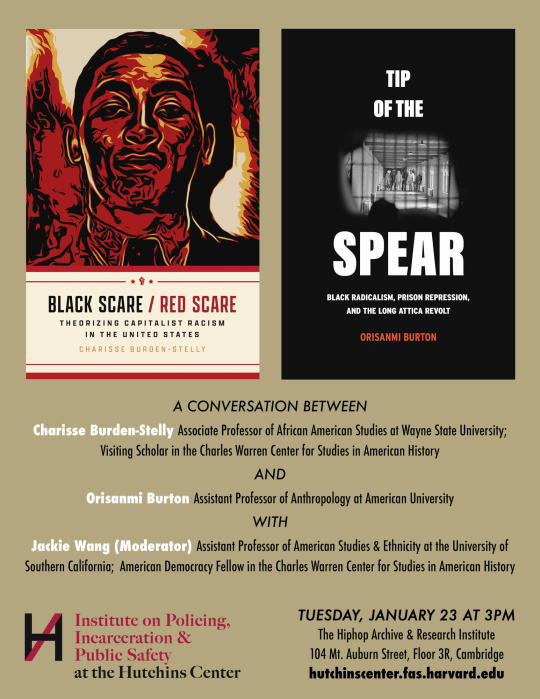
Moderating a conversation at Harvard with the authors of two of my most anticipated books of the year: Charisse Burden-Stelly's Black Scare / Red Scare and Orisanmi Burton's The Tip of the Spear.
Jan 23, 3pm at the Hiphop Archive. More info here:
https://hutchinscenter.fas.harvard.edu/event/conversation-burden-stelly-burton?delta=0
#communism#carceral studies#event#events#abolition#Orisanmi Burton#charisse burden-stelly#black communists#attica revolt#black radicalism#attica uprising#prisons
11 notes
·
View notes
Text
The evolution of my thinking comes from a combination of elevating my own political education by reading the works of Black radical thinkers and being in conversation with Black radical organizers. These are the types of experiences that helped to inform the work and political framework of Know Your Rights Camp, a nonprofit organization I co-founded in service of building power in our communities.
Colin Kaepernick in interview with Indigo Oliver in The New Republic. “Black History Is an Absolute Necessity.”
A conversation with Colin Kaepernick on Black studies, white supremacy, and capitalism
Our History Has Always Been Contraband: In Defense of Black Studies. Edited by Colin Kaepernick, Robin D. G. Kelley, and Keeanga-Yamahtta Taylor
Haymarket Books is a great book publisher and they're offering this book as a free Ebook. It's important to support organizations like Haymarket.
11 notes
·
View notes
Text
Thinking of writing a fic between Tom and Greg to raise awareness of what’s happening with Reddit and their absolutely absurd treatment of third party apps
#so here’s the deal if you want it simplified#Reddit is basically making it impossible for third party apps to exist#so by the end of the month there will only be 1 Reddit app#‘what’s the problem with that’ you might ask#well let me tell you- because this domino effect doesn’t look good at all#basically most modertors on Reddit use third party apps to moderate because the Reddit app does not give them the tools they need#now that they’re losing their tools moderation will be extremely difficult#which means inability to combate misinformation radicalization and hate speech online#and the very very awful cherry on top?#language prediction models get most of their learning from Reddit#so AI will be learning from a platform that quickly devolves into lies and hate speech#the same AI that we are beginning to incorporate into our everyday life#this is me screaming ICEBERG ICEBERG#hopefully reddits black out protest get something done because the internet ecosystem is about to enter the dark ages#I’m know I sound a bit alarmist#as someone who studies technology and misinformation at Georgetown please believe me when I say this will be a massive problem#the only solution would be for Reddit to reduce the API prices they’re charging#because we are going to enter a new era of misinformation with the addition of AI
2 notes
·
View notes
Text
“As an expression of love as radical responsibility, mutual comradeship guides activism and organizing in the Black radical tradition and helps to bridge strategic unity and productive conflict. It does all this in specifically political circumstances, with a specific political goal: the process of envisioning and striving to build a world beyond racial capitalism and imperialism—and of weathering the inevitable backlash for doing so. Moving beyond shared ideology, mutual comradeship is simultaneously an ethical, epistemological, and political practice of solidarity. Ethically, it emanates from the guiding principle of courage—the willingness to place oneself at risk for the betterment of others and shared values of cooperative social activity, a common conception of social transformation rooted in the eradication of racial capitalism, and the establishment and maintenance of expectations and standards through consistent struggle, debate, criticism, and self-criticism. These ethics are in the service of protecting, preserving, and valuing not only movements and organizations, but also each other.”
Charisse Burden-Stelly, “Settle Your Quarrels” (2023)
#charisse burden-stelly#mutual comradeship#black studies#black politics#solidarity#love#boston review#black political economists#black radical tradition#african diaspora studies#black communism
0 notes
Text
The World's Forests Are Doing Much Better Than We Think

You might be surprised to discover... that many of the world’s woodlands are in a surprisingly good condition. The destruction of tropical forests gets so much (justified) attention that we’re at risk of missing how much progress we’re making in cooler climates.
That’s a mistake. The slow recovery of temperate and polar forests won’t be enough to offset global warming, without radical reductions in carbon emissions. Even so, it’s evidence that we’re capable of reversing the damage from the oldest form of human-induced climate change — and can do the same again.
Take England. Forest coverage now is greater than at any time since the Black Death nearly 700 years ago, with some 1.33 million hectares of the country covered in woodlands. The UK as a whole has nearly three times as much forest as it did at the start of the 20th century.
That’s not by a long way the most impressive performance. China’s forests have increased by about 607,000 square kilometers since 1992, a region the size of Ukraine. The European Union has added an area equivalent to Cambodia to its woodlands, while the US and India have together planted forests that would cover Bangladesh in an unbroken canopy of leaves.
Logging in the tropics means that the world as a whole is still losing trees. Brazil alone removed enough woodland since 1992 to counteract all the growth in China, the EU and US put together. Even so, the planet’s forests as a whole may no longer be contributing to the warming of the planet. On net, they probably sucked about 200 million metric tons of carbon dioxide from the atmosphere each year between 2011 and 2020, according to a 2021 study. The CO2 taken up by trees narrowly exceeded the amount released by deforestation. That’s a drop in the ocean next to the 53.8 billion tons of greenhouse gases emitted in 2022 — but it’s a sign that not every climate indicator is pointing toward doom...
More than a quarter of Japan is covered with planted forests that in many cases are so old they’re barely recognized as such. Forest cover reached its lowest extent during World War II, when trees were felled by the million to provide fuel for a resource-poor nation’s war machine. Akita prefecture in the north of Honshu island was so denuded in the early 19th century that it needed to import firewood. These days, its lush woodlands are a major draw for tourists.
It’s a similar picture in Scandinavia and Central Europe, where the spread of forests onto unproductive agricultural land, combined with the decline of wood-based industries and better management of remaining stands, has resulted in extensive regrowth since the mid-20th century. Forests cover about 15% of Denmark, compared to 2% to 3% at the start of the 19th century.
Even tropical deforestation has slowed drastically since the 1990s, possibly because the rise of plantation timber is cutting the need to clear primary forests. Still, political incentives to turn a blind eye to logging, combined with historically high prices for products grown and mined on cleared tropical woodlands such as soybeans, palm oil and nickel, mean that recent gains are fragile.
There’s no cause for complacency in any of this. The carbon benefits from forests aren’t sufficient to offset more than a sliver of our greenhouse pollution. The idea that they’ll be sufficient to cancel out gross emissions and get the world to net zero by the middle of this century depends on extraordinarily optimistic assumptions on both sides of the equation.
Still, we should celebrate our success in slowing a pattern of human deforestation that’s been going on for nearly 100,000 years. Nothing about the damage we do to our planet is inevitable. With effort, it may even be reversible.
-via Bloomburg, January 28, 2024
#deforestation#forest#woodland#tropical rainforest#trees#trees and forests#united states#china#india#denmark#eu#european union#uk#england#climate change#sustainability#logging#environment#ecology#conservation#ecosystem#greenhouse gasses#carbon emissions#climate crisis#climate action#good news#hope
3K notes
·
View notes
Text

ID: [A poster created by Sean Saifa Wall and Micah Bazant of a Black parent holding their child. They are dressed in white and almost seem to be glowing, in front of a backdrop of multicolored waves that look like DNA strands. Colorful text reads "Protect Intersex Youth."]
"A Framework for Intersex Justice
Intersex justice is medical justice. Intersex surgeries hurt everyone.
These medical violations bring immediate harm to the child who is subjected to them.
Parents who consent to medically unnecessary surgeries participate in a culture of shame, silence and stigma, perpetuated by doctors, that allows these surgeries to continue. Parents are often left to fend for themselves as they navigate shame and guilt. The issue of parents consenting to these surgeries is especially complex when societies believe that children don’t have individual rights and that parents are always acting in their best interest.
Medical practitioners such as pediatricians, obstetricians, urologists, social workers, and endocrinologists all play a role in upholding an institution that continues to harm children with intersex variations. The practitioners, in turn, are protected by hospitals and state laws that grant them immunity.
This is why intersex justice is important.
Although the framework is evolving, the following is a definition of intersex justice co-created with Dr. Mel Michelle Lewis (they>she), an Associate Professor of Gender/Sexuality in Studio and Humanistic Studies at Maryland Institute College of Art: Intersex justice is a decolonizing framework that affirms the labor of intersex people of color fighting for change across social justice movements. By definition, intersex justice affirms bodily integrity and bodily autonomy as the practice of liberation. Intersex justice is intrinsically tied to justice movements that center race, ability, gender identity & expression, migrant status, and access to sexual & reproductive healthcare. Intersex justice articulates a commitment to these movements as central to its intersectional analysis and praxis. Intersex justice acknowledges the trauma caused by medically unnecessary and nonconsensual cosmetic genital surgeries and addresses the culture of shame, silence and stigma surrounding intersex variations that perpetuate further harm.
The marginalization of intersex people is rooted in colonization and white supremacy. Colonization created a taxonomy of human bodies that privileged typical white male and female bodies, prescribing a gender binary that would ultimately harm atypical black and indigenous bodies. As part of a liberation movement, intersex activists challenge not only the medical establishment, which is often the initial site of harm, but also governments, institutions, legal structures, and sociocultural norms that exclude intersex people. Intersex people should be allowed complete and uninhibited access to obtaining identity documents, exercising their birth and adoption rights, receiving unbiased healthcare, and securing education and employment opportunities that are free from harm and harassment. This framework serves a radical vision where intersex children are protected and survivors of genital cutting are cared for and respected. We owe that to intersex people and we owe that to ourselves.
The implementation of an intersex justice framework should include the following components: 1. Informed consent 2. Reparations 3. Legal protections 4. Accountability 5. Language 6. Children's rights 7. Patient-centered healthcare."
-Intersex Justice Project, founded by Sean Saifa Wall, Lynnell Stephani Long, and Pidgeon Pagonis.
#personal#actuallyintersex#intersex#intersex justice#intersex history#intersex pride#i see so many people use the term intersex justice and i think it's really important to understand that intersex justice is a very specific#framework#and to give the credit to the amazing activists from IJP who created it
880 notes
·
View notes
Text
the absolute mentality of the U.S right now should be studied. I can't believe how accurate that saying about democrats snapping defeat from the jaws of victory is.
the old man was up against TRUMP. A convicted felon, adjudicated rapist, accused pedophile, misogynist racist fascist. All the buzzwords rolled into one extremist mental patient. Dems still pushed for Biden to resign because of his age. You know what the stats are for presidents to get a second term? Much higher than convicted felons being sworn in. Sure, Biden isn't ideal, but he is one of the very few qualified candidates who could beat the maga hordes right now.
Ok fine, he resigned. Might've been the selfless move, best for him personally. Dunno how good it is for the nation, probably pretty bad. What now, though?
Well, surely Harris will take up the mantle. V.P, experienced prosecutor, young, charismatic, not to mention extremely progressive to meet all the quotes of democrats. Nah, that would make too much sense. I've already been seeing people argue against her. "Biden's failures are hers too", literally parroting conservatives but switching up the issues, so that instead of said "failures" angering conservatives, they anger dems.
"Careful what you wish for, a black president is how we got trump". literally arguing against diversity and progress out of fear of retaliation. not to mention, its not because obama was black that everyone's a fascist now. Its because he was a convenient scapegoat for corrupt billionaire-controlled media to use for fearmongering and angering the swing voters into maga arms. They used him to radicalize their base and the democrat voters weren't keeping up. lazy voters is how we got trump. I say we, even though im not american, because trump is definitely a global disaster.
Stop your defeatist, pessimist bullshit. stop repeating conservative talking points and stirring up controversy for now reason. stop infighting and disagreeing over candidates and just fucking settle for anyone who's not trump. you're handing this election to the guy who'll end elections. don't be a lazy voter, dont let 2016 happen again. vote blue.
#196#r/196#196 campfire#text post#wolrithposting#long post#rant#serious post#us politics#biden#trump#joe biden#kamala harris#democrats#please vote#vote blue#project 2025
607 notes
·
View notes
Text
Me: I find white, radical feminism to be actively dangerous because it is often used as a weapon of genocide, just painted over racism with a varnish of pretending to care about the lives of women of color while being completely ignorant to how gender plays a role in racial oppression. I think what fits my worldview better is black feminism, specifically the sort founded by black women who have done actual work within the community and who have contributed years of collective and academic study to how we can best address the gendered problems from oppressive society. In fact much of what I'm saying has already been mentioned in published essays and literature discussing these exact problems, as long ago as the 70s and 80s, and we even have records of newly freed slaves trying to work out these exact solutions.
Every goddamn person refusing to examine their own internalized racism because they're too addicted to their man-hate: so you think black women should just die a thousand painful deaths? You want to creep on women and beat your wife? You hate black women? You don't know any of black women's problems and you're hardly able to be counted as black yourself? Checkmate loser.
1K notes
·
View notes
Text
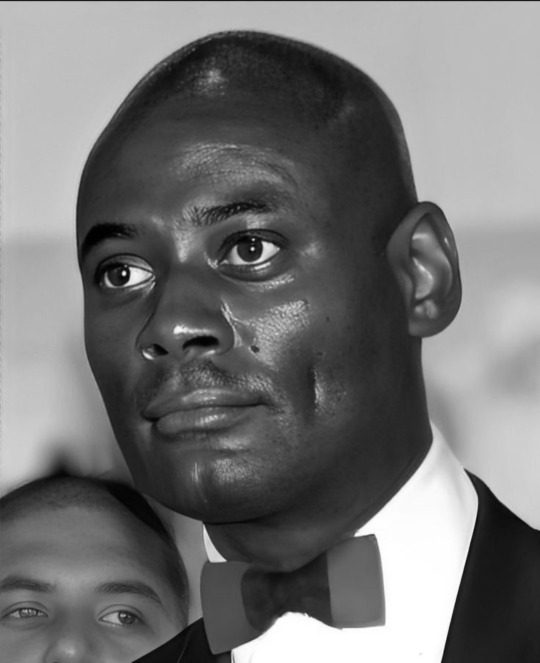
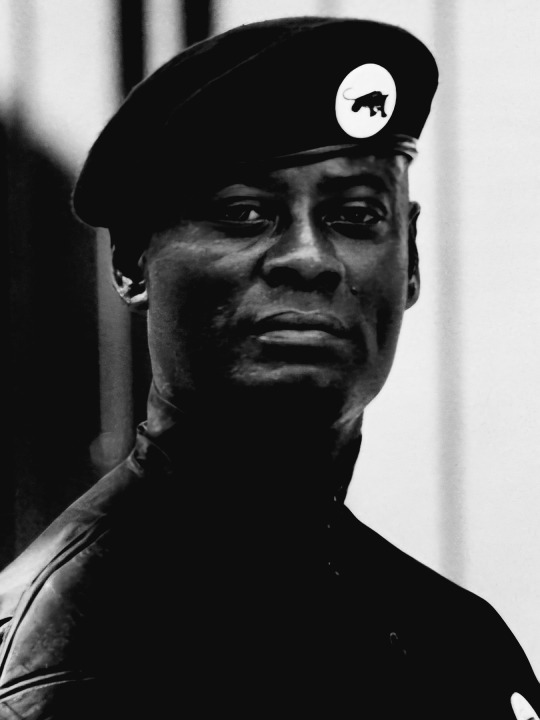
Brother Khalid Abdul Muhammad (1948–2001) was a prominent African-American activist and orator known for his unapologetic views on race and social justice. He was a fiery speaker and a great figure in the fight against systemic racism and oppression.
Khalid Muhammad was born Harold Moore Jr. in Houston, Texas. He attended Dillard University in New Orleans, where he studied theology. Later, he furthered his studies at Pepperdine University in California. It was during his college years that he became involved with the Nation of Islam (NOI).
Khalid Muhammad rose to prominence within the Nation of Islam as a minister and a top aide to Louis Farrakhan. He became the National Spokesman for the NOI and was known for his powerful speeches advocating black empowerment, self-reliance, and resistance against white supremacy. However, his incendiary remarks, particularly in a 1993 speech at Kean College, led to his suspension from the Nation of Islam.
After leaving the NOI, Khalid Muhammad became active in the New Black Panther Party (NBPP), an organization that claims ideological lineage to the original Black Panther Party but with distinct differences such as being more pan african centred. He became the group's chairman in 1998, using his leadership to expand its platform of black empowerment and militant resistance to racial injustice.
The NBPP, under Khalid Muhammad's leadership, was known for its radical and militant stance. It advocated for black self-defense, reparations for slavery, and independence from systemic oppression. Critics, including members of the original Black Panther Party, accused the NBPP of distorting the original Panthers' legacy and focusing more on confrontational rhetoric.
Khalid Muhammad's speeches often emphasized black pride, self-determination, and unity. Khalid Muhammad supporters viewed him as a fearless advocate for the black community. His death in 2001 from a brain "aneurysm" marked the end of a contentious but impactful career in activism.
#black people#black#black history#black tumblr#blacktumblr#pan africanism#black conscious#africa#black power#black empowering#khalid muhammad#black leader#new black panther party#nation of islam#african american
325 notes
·
View notes
Text
I think that the average internet Marxist is actually not much of a materialist at all, in fact in their behavior and rhetoric they seem very concerned with moral purity, the redemptive power of suffering, and the ability of narrative to shape the actual world. As myriad as the senses of the word "materialist" have come to be, none of this would seem to comport well with any of them. This all feels very Christian.
In some cases I really do think there is a latent Christianity in it, but I think the stronger source of this trend is simply the leftist emphasis on sloganeering. Somewhere along the line, maybe with the Bolshevik policy of democratic centralism or maybe somewhere else, the importance of the slogan, the party line, the supreme power of the speech act seems to have been elevated for many leftists above all other concerns. From this follows the kind of disingenuous, obviously fallacious argument you so often see from the online ML left. The point is to say the magic words that have been carefully agreed upon, the magic incantation that will defeat all opposition.
Whether it's "I don't want to vote for a candidate who supports any amount of genocide" or "The Is-not-rael Zionist entity is on the edge of collapse!" or whatever else, a rational person can recognize the impotence of these words. They don't do anything. They're just words. But the feeling seems to be that once the perfect incantation is crafted—the incantation that makes your opponent sound maximally like a Nazi without engaging with their position in good faith, or the incantation which brushes aside all thoughts of defeat, or whatever else—once the perfect incantation is crafted, all that is left to do is say it and say it and say it, and make sure everyone else is saying it too.
This is not a materialist way of approaching politics. This is a mystical way of approaching politics.
I think it's also worth saying that this tendency in Marxism seems old, it certainly predates the internet. Lots of Marxists today are vocal critics of identity politics, of what they see as the liberal, insubstantive, and idealist Diversity, Equity, and Inclusion framework. I share this criticism to a significant degree, but I'm not very eager to let Marxists off the hook here. The modern DEI framework evolved directly out of a liberal/capitalist appropriation of earlier academic ideas about social justice from such sources as Queer Studies, Black Studies, academic Feminism and so on. I say this as a neutral, factual description of its history which I believe to be essentially accurate. In turn, disciplines like Queer Studies, Black Studies, and academic Feminism each owe a great intellectual dept to academic Marxism, and likewise to the social movements of the 1960s (here in the Anglosphere), which themselves were strongly influenced by Marxism.
Obviously as the place of these fields in the academy was cemented, they lost much (most) of their radical character in practice. To a significant degree however, I think their rhetorical or performative radicalism was retained, and was further fostered by the cloistered environment of academia. In this environment the already-extant Marxist tendency to sloganeering seems in my impression to have metastasized greatly. And so I think the political right is not actually wrong, or not wholly wrong, when they attribute the speech-act-centrism of modern American (and therefore, online) politics, its obsession with saying things right above doing things right and its constantly shifting maze of appropriate forms of expression, at least in part to Marxism.
Now I should say that I don't think the right is correct about much else in this critique, and I also don't think this is wholly attributable to Marxism. But I think there's plainly an intellectual dept there.
More than anything else, this is my genuine frustration with both Marxism as it exists today and with its intellectual legacy as a whole. I fundamentally do not believe in the great transformative power of speech acts, I do not believe in the importance of holding the correct line, I do not believe that the specifics of what you say or how you say it matter nearly as much as what you do. I do not think there is much to be gained from playing the kind of language games that Marxists often like to play, and I do not think that playing language games and calling it "materialist analysis" is a very compelling means of argument.
246 notes
·
View notes
Text
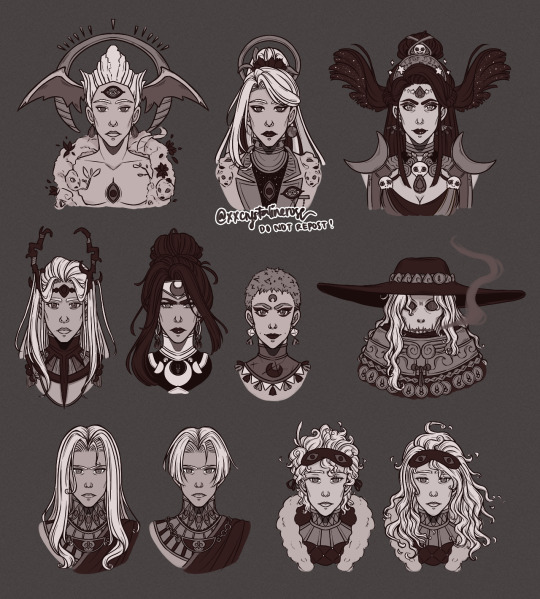
In light of Hades 2 adding new designs and MORE Nyxblings, here's a little face study I did of Chaos, Nyx, and their family. Someone once mentioned that Nyx's children who's got features she doesn't have actually have Chaos' features instead, and I wanted to compare and see which child resembles who more.
Additionally, shoutout to @blood-starved-beast for their post about the age order of Nyx's children because it has helped immensely with the brainrot.
Detailed analysis under the cut.
Firstly, the parents:
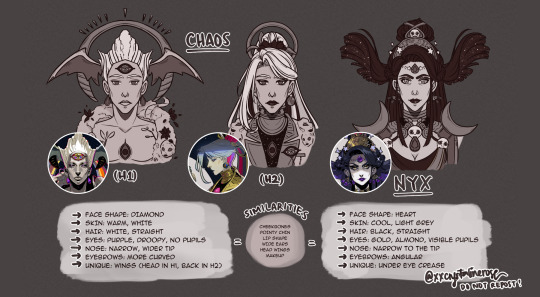
For parent and daughter, Chaos and Nyx don't really look the same. However, the cheekbones and jawline that could cut glass is hereditary lol. I wonder if there are other children of Chaos who look more similar to them?
I also like how Chaos' Hades 2 appearance could be a nod to them reconnecting with Nyx and probably wanting to look more "normal" (or as normal as they could get) for the family reunions. The exact same makeup style is cute.
Next up, we have the older children (excluding the Fates, whom we haven't seen yet):
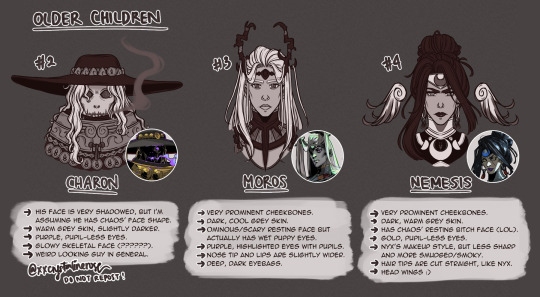
Charon is a tough nut to crack because his portrait is so heavily shadowed and he also wears a bigass hat, so I don't really know his facial structure, but from what I could see, it's more like Chaos'.
Moros' eye shape is weirdly different from the rest of the siblings, but they appear to be downturned and large, which is closer to Nyx's eye shape. While his facial structure is more like Chaos', his eyes in particular make him look softer.
Nemesis actually has a different face structure from Nyx. Her coloring is the exact same (sans skin tone), but not the face. However, her hairstyle is similar, including the updo.
Lastly, the younger children:
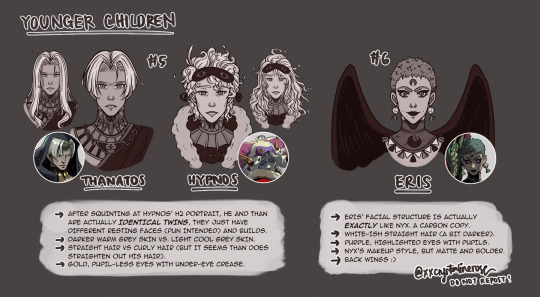
It's probably because Hypnos' expression was drawn more comically, but as soon as I take a good look at his new portrait it's made greatly apparent that he and Thanatos are actually identical in terms of facial features. What makes them appear even more different is the hairstyle; Than's go straight down, Hypnos' is fluffy and piled high on his head. They also have similar face shape as Nyx, but with a squarer jawline.
You'd think their hairstyles are radically different. However, this official art of long-haired Than shows that his hair curls at the ends. His hair is straight now, but I'd like to think he straightens it out, because otherwise it would look a bit wavy still.
As for Eris, people keep saying that Nem looks like Nyx the most, but Eris looks astonishingly similar to Nyx. Oh, the irony of looking like the parent you detest.
Summary (and some thoughts):
Face structure-wise, the older children look more like Chaos, while the younger children look more like Nyx.
Of all Nyxblings we've known, only Nemesis has black hair.
Except for Charon, the children's eye art style is reversed between Chaos' and Nyx's (the ones with purple eyes have visible pupils and highlights, while the gold-eyed ones have no visible pupil or highlight).
Where did the curly hair genes come from? The twins are explicitly stated to be fatherless, too. Maybe some other children of Chaos have curly hair? Maybe Gaia, as she was mentioned in Hades 2?
I have a theory that the older children look more eldritch (more similar to Chaos), and only started to look "normal" during Nyx's separation from Chaos, and the cutoff point is Moros, unless Momus is older than him. Would be cool if the Fates are an amalgam of three bodies, because they're triplets and older than Charon.
Thanatos cutting his hair was actually a smart decision because his new hairstyle flatters his face shape more. I'm sorry darling but you don't have game in styling long hair. Too bad he and Moros don't know each other, big brother could've given him tips.
The entire family is hot. Nuff said.
#ksadraws#ksatalks#i love the variety and slight differences between the nyxblings so much :))#hades 2#hades game#hades 2 fanart#hades fanart#chaos hades#nyx hades#charon hades#moros hades#nemesis hades#thanatos hades#hypnos hades#eris hades
397 notes
·
View notes